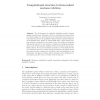267 search results - page 34 / 54 » OWL and Qualitative Reasoning Models |
COSIT
2001
Springer
14 years 2 months ago
2001
Springer
The development of cognitively plausible models of human spatial reasoning may ultimately result in computational systems that are better equipped to meet human needs. This paper e...
QEST
2007
IEEE
14 years 4 months ago
2007
IEEE
Stochastic game logic (SGL) is a new temporal logic that combines features of alternating temporal logic (to formalize the individual views and cooperation and reaction facilities...
CONTEXT
2007
Springer
14 years 4 months ago
2007
Springer
Abstract. We study the extension of context ontologies towards enhanced qualitative spatio-temporal representations and reasoning. Our goal is to model and extract events that are ...
ECSQARU
2005
Springer
14 years 3 months ago
2005
Springer
The most problematic and challenging issues in fuzzy modeling of nonlinear system dynamics deal with robustness and interpretability. Traditional data-driven approaches, especially...
CONSTRAINTS
1998
13 years 9 months ago
1998
Many temporal applications like planning and scheduling can be viewed as special cases of the numeric and symbolic temporal constraint satisfaction problem. Thus we have developed ...

